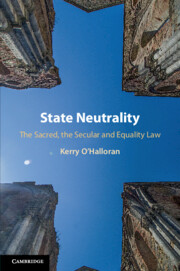Book contents
- State Neutrality
- State Neutrality
- Copyright page
- Dedication
- Contents
- Acknowledgements
- Introduction
- Part I Background
- Part II The Benchmark of State Neutrality
- 4 The United States of America: The Church–State Wall
- 5 Canada: Bijuralism
- 6 England: The Established Church
- 7 France: Laïcité
- 8 Germany: The Vaterland
- 9 Israel: Halakha and Zionism
- Part III Towards a More Stable Civil Society
- Conclusion
- Index
7 - France: Laïcité
from Part II - The Benchmark of State Neutrality
Published online by Cambridge University Press: 15 January 2021
- State Neutrality
- State Neutrality
- Copyright page
- Dedication
- Contents
- Acknowledgements
- Introduction
- Part I Background
- Part II The Benchmark of State Neutrality
- 4 The United States of America: The Church–State Wall
- 5 Canada: Bijuralism
- 6 England: The Established Church
- 7 France: Laïcité
- 8 Germany: The Vaterland
- 9 Israel: Halakha and Zionism
- Part III Towards a More Stable Civil Society
- Conclusion
- Index
Summary
Begins with the church–state relationship, noting the beginnings of laïcité in the French Revolution, as proclaimed in Article 10 of the Declaration of the Rights of Man and of the Citizen 1789 and its continuing significance as embedded in Article 1 of the French Constitution and in the loi du 9 Decembre 1905. Considers current government policy towards religion, the modern interpretation of laïcité and its relevance to multiculturalism and diversity. Examines the fundamental freedoms: the rights to freedom of religion, to freedom of association/assembly and the freedom of expression. Examines concepts such as “religion” and “belief”. Focuses on how the fundamental rights impact upon the church–state relationship; the means whereby religion and the state are legally protected from each other; and considers the law relating to the manifesting of religion and beliefs. Examines the equality case law, then the case law dealing with the church–state relationship and areas of everyday life including education, employment, healthcare and retail services. It concludes with a section that addresses security from terrorism and from the destabilising effects of mass migration.
Keywords
- Type
- Chapter
- Information
- State NeutralityThe Sacred, the Secular and Equality Law, pp. 308 - 356Publisher: Cambridge University PressPrint publication year: 2021

